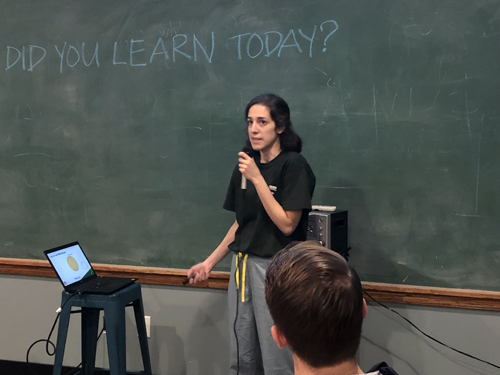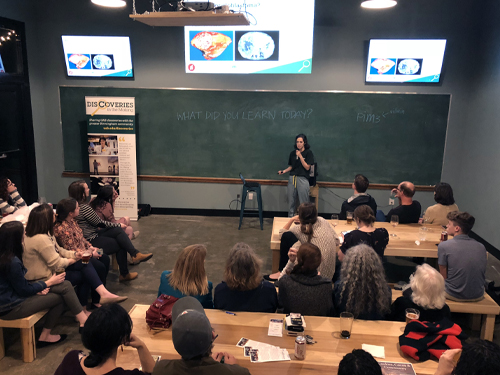Children’s of Alabama is adding a surgical resident and Ph.D. student to its repertoire of award-winning research scientists. Raoud Marayati, M.D., is putting up a fight against the villain behind pediatric liver cancer’s biggest enemy: metastatic hepatoblastoma.
Hepatoblastoma is the most common liver cancer in children and typically diagnosed within the first 5 years of life. When this type of tumor spreads throughout the body, these children are sick and are bound to receive chemotherapy (or something like that) for most of their pre-school years. The prognosis for these young children is poor and new treatment therapies have not been developed in more than 20 years. Working in the research lab of Elizabeth Beierle, M.D., Marayati is out to change that.
 She was one of two students who kicked off the UAB Discoveries in the Making seminar series for 2019. She gave an in-depth look at her research, showed pictures of tumor cells she has grown and explained how she is trying to fight pediatric liver cancer as a surgeon-scientist to a room of nearly 80 people eagerly asking questions about her journey as a scientist and how her work will have an impact on scientists and non-scientists alike.
She was one of two students who kicked off the UAB Discoveries in the Making seminar series for 2019. She gave an in-depth look at her research, showed pictures of tumor cells she has grown and explained how she is trying to fight pediatric liver cancer as a surgeon-scientist to a room of nearly 80 people eagerly asking questions about her journey as a scientist and how her work will have an impact on scientists and non-scientists alike.
“My main scientific interest is metastasis,” Marayati said. “I want to know how these tumors develop the ability to spread throughout the body. I want to know what makes some tumors spread faster than others. We think a protein called PIM3 is playing a big role in this process.”
PIM3 is a protein responsible for the growth and survival of hepatoblastoma tumors. Marayati’s lab found that there is an overabundance of PIM3 in hepatoblastoma tumor cells compared to normal cells. They also found that tumor cells with more PIM3 were able to travel from the liver tumor and invade other tissues in the body, leading to metastasis.
When Marayati is in the lab, she uses DNA scissors to cut PIM3 so that it no longer works in tumor cells. What she found was when PIM3 is cut out, tumor cells do not grow or metastasize as quickly.
“This means PIM3 is doing something important to the invasiveness of the tumor,” she explained. “I am working to understand how this one protein is affecting that invasive process and metastasis.
With regard to cancer invasion and metastasis, multiple important steps comprise the metastatic process. The first step is migration, where tumor cells migrate away from the primary, or original, tumor. The second step is the invasion, where those tumor cells invade neighboring tissues and blood vessels. Following these two steps, the cells begin traveling through the blood to other tissues in the body where they grow a new tumor in the new tissue.
Through her research, Marayati has found that in cells where PIM3 is cut out, tumor cells not only grow slower and die faster, they show difficulty migrating and they do not invade other tissues as easily as original tumor cells that have PIM3. All this together has shown Marayati that PIM3 is the villain she is fighting in the battle against metastatic hepatoblastoma.
 Her research is cutting-edge in the world of pediatric oncology but the scientist behind the pipette makes it all possible. Marayati attended medical school at the University of Aleppo Faculty of Medicine in Syria, which is where she is originally from. After receiving her medical degree, she completed a postdoctoral fellowship at the University of North Carolina at Chapel Hill where she studied tumorigenesis and metastasis in pancreatic and colorectal cancers in the lab of Jen Jen Yeh, M.D. She proceeded to join the list of accomplished surgical residents at UAB where she yearned to continue studying metastatic cancer. She sought research opportunities and earned a position as a UAB ARISE-MD Scholar, a program through the Department of Surgery and the Graduate School for physicians to achieve a Ph.D. in order to become an academic medical research scientist.
Her research is cutting-edge in the world of pediatric oncology but the scientist behind the pipette makes it all possible. Marayati attended medical school at the University of Aleppo Faculty of Medicine in Syria, which is where she is originally from. After receiving her medical degree, she completed a postdoctoral fellowship at the University of North Carolina at Chapel Hill where she studied tumorigenesis and metastasis in pancreatic and colorectal cancers in the lab of Jen Jen Yeh, M.D. She proceeded to join the list of accomplished surgical residents at UAB where she yearned to continue studying metastatic cancer. She sought research opportunities and earned a position as a UAB ARISE-MD Scholar, a program through the Department of Surgery and the Graduate School for physicians to achieve a Ph.D. in order to become an academic medical research scientist.
To add to her extraordinary accolades, last year Marayati was awarded the 2018-2019 Society of University Surgeons Resident Research Scholar award, making her one of the only residents in the history of the UAB Department of Surgery to receive a research grant while in residency. This resident research grant was awarded for her research project titled “PIM3 Kinase Promotes Tumor Metastasis in Hepatoblastoma” which is ultimately how she ended up working on solving the puzzle of PIM3 in hepatoblastoma metastasis in pediatric patients.